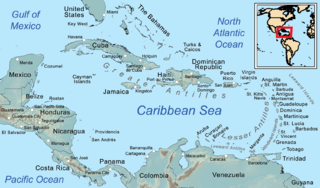
The history of the Caribbean reveals the significant role the region played in the colonial struggles of the European powers since the 15th century. In the modern era, it remains strategically and economically important. In 1492, Christopher Columbus landed in the Caribbean and claimed the region for Spain. The following year, the first Spanish settlements were established in the Caribbean. Although the Spanish conquests of the Aztec empire and the Inca empire in the early sixteenth century made Mexico and Peru more desirable places for Spanish exploration and settlement, the Caribbean remained strategically important.

The Arawak are a group of Indigenous peoples of northern South America and of the Caribbean. Specifically, the term "Arawak" has been applied at various times from the Lokono of South America to the Taíno, who lived in the Greater Antilles and northern Lesser Antilles in the Caribbean. All these groups spoke related Arawakan languages.

The Kalinago, formerly known as Island Caribs or simply Caribs, are an Indigenous people of the Lesser Antilles in the Caribbean. They may have been related to the Mainland Caribs (Kalina) of South America, but they spoke an unrelated language known as Island Carib. They also spoke a pidgin language associated with the Mainland Caribs.

Rose of Lima, TOSD was a member of the Third Order of Saint Dominic in Lima, Peru, who became known for both her life of severe penance and her care of the poverty stricken of the city through her own private efforts. Rose of Lima was born to a noble family and is the patron saint of embroidery, gardening and cultivation of blooming flowers. A lay member of the Dominican Order, she was declared a saint by the Catholic Church, being the first person born in the Americas to be canonized as such.

Royal Bank of Canada is a Canadian multinational financial services company and the largest bank in Canada by market capitalization. The bank serves over 20 million clients and has more than 100,000 employees worldwide. Founded in 1864 in Halifax, Nova Scotia, it maintains its corporate headquarters in Toronto and its head office in Montreal. RBC's institution number is 003. In November 2017, RBC was added to the Financial Stability Board's list of global systemically important banks.

Emancipation Day is observed in many former European colonies in the Caribbean and areas of the United States on various dates to commemorate the emancipation of slaves of African descent.

The Presbyterian Church in Canada is a Presbyterian denomination, serving in Canada under this name since 1875. The United Church of Canada claimed the right to the name from 1925 to 1939. According to the Canada 2021 Census 301,400 Canadians identify themselves as Presbyterian, that is, 0.8 percent of the population.
St. Joseph Island is in the northwestern part of Lake Huron. It is part of the Canadian province of Ontario. At 365 km2 (141 sq mi) in area, it is the sixth largest lake island in the world; the second largest island on Lake Huron, following Manitoulin Island; and the third largest of all the islands on the Great Lakes, trailing Manitoulin and Lake Superior's Isle Royale.
Rev. Kenneth James Grant (1839–1932) was a Canadian Presbyterian missionary who was one of the founding fathers of the Presbyterian Church of Trinidad and Tobago and was a founder of secondary education among East Indians.

UTC−04:00 is an identifier for a time offset from UTC of −04:00.
Caribbean literature is the literature of the various territories of the Caribbean region. Literature in English from the former British West Indies may be referred to as Anglo-Caribbean or, in historical contexts, as West Indian literature. Most of these territories have become independent nations since the 1960s, though some retain colonial ties to the United Kingdom. They share, apart from the English language, a number of political, cultural, and social ties which make it useful to consider their literary output in a single category. The more wide-ranging term "Caribbean literature" generally refers to the literature of all Caribbean territories regardless of language—whether written in English, Spanish, French, Hindustani, or Dutch, or one of numerous creoles.
Edelgard Elspeth Mahant is a Canadian academic, who teaches political science at York University's Glendon College in Toronto, Ontario and University of Botswana.
The Ortoiroid people were the second wave of human settlers of the Caribbean who began their migration into the Antilles around 2000 BCE. They were preceded by the Casimiroid peoples. They are believed to have originated in the Orinoco valley in South America, migrating to the Antilles from Trinidad and Tobago to Puerto Rico. The name "Ortoiroid" comes from Ortoire, a shell midden site in southeast Trinidad. They have also been called Banwaroid, after another archaeological site in Trinidad.

The Puerto Rico Open is a professional golf tournament on the PGA Tour that was first played in 2008. It is the only PGA Tour event ever held in Puerto Rico. The tournament is played at the Coco Beach Golf Course which was designed by Tom Kite. From its inception through 2015, it was played in early March as an alternate event to the WGC-Cadillac Championship, but in 2016 it moved to late March, opposite the WGC-Dell Match Play. All four rounds are broadcast on the Golf Channel.
Racism in North America and the state of race relations there are described in this article. Racism manifests itself in different ways and severities throughout North America depending on the country. Colonial processes shaped the continent culturally, demographically, religiously, economically, and linguistically. Racism was part of that process and is exemplified throughout North America today but varies regionally.

The Caribbean is a subregion of the Americas that includes the Caribbean Sea and its islands, some of which are surrounded by the Caribbean Sea and some of which border both the Caribbean Sea and the North Atlantic Ocean; the nearby coastal areas on the mainland are sometimes also included in the region. The region is south-east of the Gulf of Mexico and Northern America, east of Central America, and north of South America.

Fort Allen, officially Fort Allen Training Center, is a Puerto Rico National Guard military installation located on a 373-hectare (921-acre) facility in Juana Díaz, Puerto Rico.
The Presbyterian Church of Trinidad and Tobago is a Presbyterian church in Trinidad and Tobago, established by missionaries from the Presbyterian Church in Canada.

The Church of Jesus Christ of Latter-day Saints in the Lesser Antilles refers to The Church of Jesus Christ of Latter-day Saints and its members in the Lesser Antilles. The Lesser Antilles is part of the Caribbean Area and is part of three missions. As of 2022, the LDS Church reported 9,959 members in 34 congregations in the Lesser Antilles.











